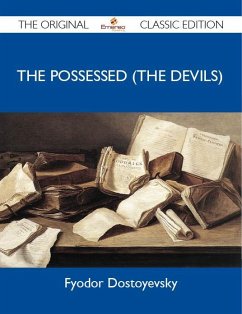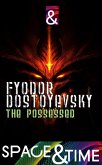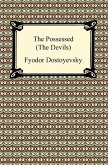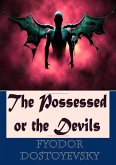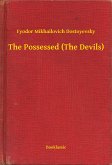Ive always felt that fiction is like a window to the past, and with The Devils, Dostoevsky gives us a clear glimpse at the underground politics brewing in Czarist Russia. At the same time, his propensity to write about criminals and people with criminal hearts is nowhere more emphasized among his major novels than in this one. There is not one character I could identify as a traditional hero, not even the semi-anonymous narrator, who relates the novels events with the impartiality of a security camera; they are all antiheros -- a room full of Raskolnikovs.
The novel concerns a small band of Russian intellectuals, atheists, socialists, anarchists, and various other rabble who are distributing subversive leaflets in an attempt to incite the proletariat to revolt against the government. They are a motley group, destined to fail because they lack general competence, organizational skills, a clear agenda, definite plans, and even uniform ideas. The only thing they have in common is that they dont like the way things currently are in Russia and intend to change them, violently if necessary.
Among this group we meet Nicholas Stavrogin, an obnoxious, insensitive young man who is only looking out for himself and is not above having affairs with his friends wives. The groups prime mover and instigator is Peter Verkhovensky, whose father Stepan had been Nicholass tutor and is still living platonically with Nicholass widowed mother, one of the wealthier citizens of the town in which the novel takes place. The groups rank-and-file who figure most prominently into the plot include the suicidal Kirilov, a former member (and potential informer) named Shatov who just wants to put it all behind him, a useless drunkard named Lebyatkin who acts as the groups stooge, and an escaped convict named Fedka who becomes the groups henchman.
That many of these people are dead by the end of the novel is not as surprising as how they get that way. The plot is built around intrigues, disloyalties, and the type of drawing-room confessions and revelations that characterize the best mysteries. Its not difficult to guess that there is a juicy secret about Lebyatkins crippled, mentally disturbed sister Mary, or that the elegant fete arranged by Julia Lembke, the Governors wife, will culminate in a spectacular, outrageous, and perhaps deadly climax; Dostoevsky likes sensationalism and never misses a chance to use human frailty and folly as hosts upon which the morally hollow feed like parasites.
Dostoevskys description of these men as devils is a biblical allusion to the book of Luke, translating Christs power to drive the devils out of a possessed man into a herd of swine to the cleansing of Russia of its nefarious political elements. It would appear that The Devils is Dostoevskys effort to demonize the soulless, devilish radicals who have no moral underpinnings and who would replace everything he considers good about Russia (namely, the Eastern Orthodox Church) with Western ideas. There is an obvious parallel to the Bolshevik Revolution of nearly half a century later, which shows that such Socialist sentiment had been bubbling under the Russian mainstream for many years prior to its twentieth century emergence. In that sense, this is a prescient novel of historical and political interest.
The novel concerns a small band of Russian intellectuals, atheists, socialists, anarchists, and various other rabble who are distributing subversive leaflets in an attempt to incite the proletariat to revolt against the government. They are a motley group, destined to fail because they lack general competence, organizational skills, a clear agenda, definite plans, and even uniform ideas. The only thing they have in common is that they dont like the way things currently are in Russia and intend to change them, violently if necessary.
Among this group we meet Nicholas Stavrogin, an obnoxious, insensitive young man who is only looking out for himself and is not above having affairs with his friends wives. The groups prime mover and instigator is Peter Verkhovensky, whose father Stepan had been Nicholass tutor and is still living platonically with Nicholass widowed mother, one of the wealthier citizens of the town in which the novel takes place. The groups rank-and-file who figure most prominently into the plot include the suicidal Kirilov, a former member (and potential informer) named Shatov who just wants to put it all behind him, a useless drunkard named Lebyatkin who acts as the groups stooge, and an escaped convict named Fedka who becomes the groups henchman.
That many of these people are dead by the end of the novel is not as surprising as how they get that way. The plot is built around intrigues, disloyalties, and the type of drawing-room confessions and revelations that characterize the best mysteries. Its not difficult to guess that there is a juicy secret about Lebyatkins crippled, mentally disturbed sister Mary, or that the elegant fete arranged by Julia Lembke, the Governors wife, will culminate in a spectacular, outrageous, and perhaps deadly climax; Dostoevsky likes sensationalism and never misses a chance to use human frailty and folly as hosts upon which the morally hollow feed like parasites.
Dostoevskys description of these men as devils is a biblical allusion to the book of Luke, translating Christs power to drive the devils out of a possessed man into a herd of swine to the cleansing of Russia of its nefarious political elements. It would appear that The Devils is Dostoevskys effort to demonize the soulless, devilish radicals who have no moral underpinnings and who would replace everything he considers good about Russia (namely, the Eastern Orthodox Church) with Western ideas. There is an obvious parallel to the Bolshevik Revolution of nearly half a century later, which shows that such Socialist sentiment had been bubbling under the Russian mainstream for many years prior to its twentieth century emergence. In that sense, this is a prescient novel of historical and political interest.
Dieser Download kann aus rechtlichen Gründen nur mit Rechnungsadresse in A, D ausgeliefert werden.

